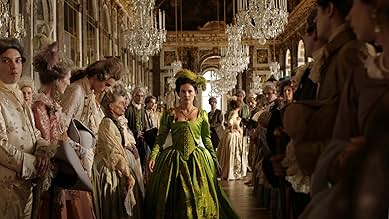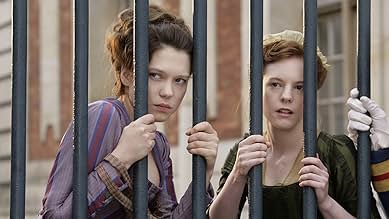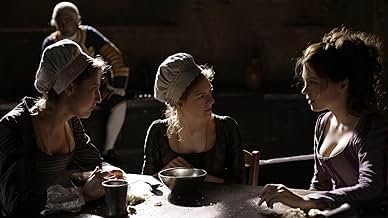IMDb RATING
6.2/10
9.4K
YOUR RATING
A look at the platonic relationship between Marie Antoinette and one of her female readers during the first days of the French Revolution.A look at the platonic relationship between Marie Antoinette and one of her female readers during the first days of the French Revolution.A look at the platonic relationship between Marie Antoinette and one of her female readers during the first days of the French Revolution.
- Director
- Writers
- Stars
- Awards
- 6 wins & 12 nominations total
Julie-Marie Parmentier
- La servante Honorine Aubert
- (as Julie-Marie Parmentier de la Comédie Française)
Marthe Guérin Caufman
- La domestique Alice
- (as Marthe Caufman)
Hervé Pierre
- L'abbé Hérissé
- (as Hervé Pierre de La Comédie Française)
- Director
- Writers
- All cast & crew
- Production, box office & more at IMDbPro
Featured reviews
Farewell My Queen screened recently at the Rendezvous with French Cinema festival in New York. A different take on the oft-told story of Marie Antoinette and the storming of the Bastille, this French film focuses on the difficult behind-the-scenes life at Versailles. An "Upstairs Downstairs" at the grandest palace of all, the protagonist is not the queen but rather her "lectrice" - a lady in waiting whose job is to read books to the bored Marie Antoinette. The film is best at depicting the petty backstabbing, gossiping and ambitions of the hangers-on at court. The crowded and dirty "back stairs" rooms are vividly contrasted to the opulence of the grand state halls. A well acted, nicely paced historical drama.
Written and directed by Benoît Jacquot and based on the novel by Chantal Thomas, Farewell, My Queen explores the death throes of the French monarchy over a period of three days in July, 1789. Set in the Palace of Versailles at the beginning of the French Revolution, Sidonie (Lea Seydoux), known as the reader for Queen Marie-Antoinette (Diane Kruger), is responsible for selecting books and reading them aloud to the queen. Because of her closeness to the monarch, she is able to act as a spy, securing information about events taking place inside and outside the palace, pressing selected servants for information, and eavesdropping on conversations to gather the most up-to-date gossip to pass along to Marie.
The film is seen from Sidonie's point of view, a vantage point that illuminates the sharp social divisions inside the palace with the servants living in crowded rat-infested quarters, and the royals dwelling in opulent accommodations. Lea Seydoux delivers a powerful performance as the devoted servant of the queen, conveying an air of mystery about who she really is in a way that adds to her allure. Kruger portrays Marie-Antoinette as sensual and hedonistic and there is a hint of more than Platonism in the way she interacts with both Sidonie and the Duchess de Polignac (Virginie Ledoyen), a relationship that tests Sidonie's loyalty.
On the morning of July 15th, news spreads rapidly that the king had been awakened at two in the morning. No one knows the reason, but fear spreads throughout the court. If the king is ill, who will protect those totally dependent on the nobles who control their lives? It is soon revealed, however, that the king is not ill, but that a mob has stormed the Bastille and a revolt has begun against the aristocracy. Little information is available. Rumors abound based only on conversations whispered in the hallways and the servant's quarters. When the King travels to Paris and the Queen decides against an escape to Metz, an aura of inevitably descends on the Palace and the nobles begin to abandon ship, competing for places on the coaches seeking a safe haven.
Antoinette makes every effort to continue with business as usual, looking at magazines to admire new styles and colors for the coming season, paying scant attention to the fact that her name is number one in a list of 300 targets for the guillotine. Fearful of losing her only connection to the world, Sidonie is willing to risk the ultimate sacrifice if it is in the queen's best interest. Even though Farewell, My Queen is historically questionable and may hold us at arms length emotionally, it provides a fresh view of events that we know about only from history books or stuffy costume dramas.
Jacquot captures the authenticity of time and place and also the human side of the power struggle. Unfortunately, the film pays little attention to the issues that led to the revolt, never mentioning the abuse of power by the monarchy. Indeed, the Revolution serves only as a backdrop for the story which is more about seduction, loyalty, and betrayal than social upheaval. Rather than making a statement that is relevant for our times, the intricacies of sexual intrigue and love triangles dominate the film, titillating rather than persuading, and making the goings on difficult to care about.
The film is seen from Sidonie's point of view, a vantage point that illuminates the sharp social divisions inside the palace with the servants living in crowded rat-infested quarters, and the royals dwelling in opulent accommodations. Lea Seydoux delivers a powerful performance as the devoted servant of the queen, conveying an air of mystery about who she really is in a way that adds to her allure. Kruger portrays Marie-Antoinette as sensual and hedonistic and there is a hint of more than Platonism in the way she interacts with both Sidonie and the Duchess de Polignac (Virginie Ledoyen), a relationship that tests Sidonie's loyalty.
On the morning of July 15th, news spreads rapidly that the king had been awakened at two in the morning. No one knows the reason, but fear spreads throughout the court. If the king is ill, who will protect those totally dependent on the nobles who control their lives? It is soon revealed, however, that the king is not ill, but that a mob has stormed the Bastille and a revolt has begun against the aristocracy. Little information is available. Rumors abound based only on conversations whispered in the hallways and the servant's quarters. When the King travels to Paris and the Queen decides against an escape to Metz, an aura of inevitably descends on the Palace and the nobles begin to abandon ship, competing for places on the coaches seeking a safe haven.
Antoinette makes every effort to continue with business as usual, looking at magazines to admire new styles and colors for the coming season, paying scant attention to the fact that her name is number one in a list of 300 targets for the guillotine. Fearful of losing her only connection to the world, Sidonie is willing to risk the ultimate sacrifice if it is in the queen's best interest. Even though Farewell, My Queen is historically questionable and may hold us at arms length emotionally, it provides a fresh view of events that we know about only from history books or stuffy costume dramas.
Jacquot captures the authenticity of time and place and also the human side of the power struggle. Unfortunately, the film pays little attention to the issues that led to the revolt, never mentioning the abuse of power by the monarchy. Indeed, the Revolution serves only as a backdrop for the story which is more about seduction, loyalty, and betrayal than social upheaval. Rather than making a statement that is relevant for our times, the intricacies of sexual intrigue and love triangles dominate the film, titillating rather than persuading, and making the goings on difficult to care about.
Before going in to see Farewell, My Queen, I really did not know too much about it and now I am glad that I knew little to nothing about the film before I saw it. I knew it was about Marie Antoinette, but that was about it. I haven't seen too many films about Marie Antoinette, other than Sofia Coppola's 2006 film which I liked quite a bit. Both films offer a different look and perspective on her, one of the things I really liked about this film as well. Lea Seydoux does a terrific job playing Sidonie Laborde, who is Marie Antoinette's reader. Seydoux allows her character to have a very curious side to her and at times she is really determined to stand up for what she believes in and can be forceful all at the same time as having an innocence to her as most young women do. It's a great performance and one that I hope leads to a successful career for her. Diane Kruger, who plays Marie Antoinette does a good job as well, but at times I did find her performance a tad melodramatic and so sometimes it felt a bit forced, or over the top. However, both Seydoux and Kruger both do show infatuation and they show it well. I can not go into any more detail than that, or I would ruin the film, but Kruger is especially good at showing Marie Antoinette's more softer and human side. A side that recognizes her fear, her flaws and truths about her own personality. Seydoux's character Sidonie is so loyal to the queen that she almost loves her, but as the film goes on, we are not really sure why. The queen can be very vicious and uncaring to Sidonie, but yet this young woman cares deeply about the queen and what is in the queen's best interest is most important for Sidonie putting the queen's needs even ahead of her own. As, I got thinking about the film, I think this part of it really had an impact on me and touched me and made me think in several ways. Here is a young woman who is more, or less an orphan and goes about her life serving and thinking of ways to keep the queen happy even though she herself lives in squalor and does not have the material wealth, possessions, or honour that the queen has. The queen seems to have everything and yet seems only to think about herself, whereas Sidonie was born with nothing and lives with nothing, but feels in her heart and soul that it is her job to serve the queen and she will do so no matter what, even if there could be consequences to her decisions. My only other complaint about the film was that at times it did feel a bit rushed and maybe moved from one event to another quite quickly, but that did not stop my enjoyment of the film, I think it just asks us as viewers to be a little more patient and do some of the character analysis, or study on our own, or even after the film is over. Even though the film does move by fast we are especially treated to a very good character study of Sidonie, who I think is the most interesting character in the film and probably the one we can relate to and even care about the most. She seems the most human whereas everyone else really does seem to be looking out for themselves and not really caring about what happens to the person next to them. The film does a credible job of showing the majestic costumes and lavish clothes and settings where Marie Antoinette lives, but at the same time it shows the dark and dingy place where Sidonie eats and sleeps and basically calls home. There is an element here showing a class struggle between these two characters and the more you think of it, the more evident it becomes. Farewell, My Queen is a good looking film with a terrific performance by Lea Seydoux, good character study and a film that gives us much to think about and even more to appreciate after the film is over and we have thought it over for awhile. As, I have said before, this is the quality of a great film.
Farewell, My Queen is a French film that covers three days in the life of servant Sidonie. She is Marie Antoinette's reader. The three days cover the early days of the French Revolution as seen through her eyes. Be advised, this is not a film about Marie Antoinette. If you are entertained by the series Downton Abbey or Upstairs Downstairs and enjoying stealing a glimpse behind the inner workings of court life this film will not disappoint.
There is no exposition at the beginning of this film. The dialog is French with English subtitles. The original audience would be expected to be familiar with the basic history and players of the French Revolution. If you are not familiar, it's a good idea to review this time period before seeing the film.
A sense of mystery is evoked by a combination of narrative reveals and soundtrack. It's a handsome film that duly contrasts the masters and servants via costumes, sets and cinematography. The performances are particularly effective as Diane Kruger and Lea Seydoux are well cast and empathetic in their roles.
There is no exposition at the beginning of this film. The dialog is French with English subtitles. The original audience would be expected to be familiar with the basic history and players of the French Revolution. If you are not familiar, it's a good idea to review this time period before seeing the film.
A sense of mystery is evoked by a combination of narrative reveals and soundtrack. It's a handsome film that duly contrasts the masters and servants via costumes, sets and cinematography. The performances are particularly effective as Diane Kruger and Lea Seydoux are well cast and empathetic in their roles.
It's July, 1789, and French citizenry is starting to revolt. Queen Marie Antoninette (Diane Kruger) is hold up at Château de Versailles with her court and her book reader (Léa Seydoux). When the news of the storming of the Bastille reaches them, panic sets in and the King's entourage start slipping away.
It's fascinating to see the various reaction as rumors start to spread. Léa Seydoux is great as the doe-eyed true believer. It is disconcerting to know her true naivety even though she has no idea. It's the source of the tension, but it's also infuriating. Diane Kruger is fine, but I thought that it wasn't quite big enough. However, the climax was just right.
It's fascinating to see the various reaction as rumors start to spread. Léa Seydoux is great as the doe-eyed true believer. It is disconcerting to know her true naivety even though she has no idea. It's the source of the tension, but it's also infuriating. Diane Kruger is fine, but I thought that it wasn't quite big enough. However, the climax was just right.
Did you know
- TriviaIn this movie, Diane Kruger speaks French with a German/Austrian accent - which is undoubtedly how the Austrian-born Marie Antoinette would have spoken herself.
- GoofsOn several occasions when soldiers are marching through the main and side gates of Versailles, and also when Sidonie goes to Le Petite Trianon for the first time and falls into a puddle, you can clearly see the very 21st century anti-terrorism concrete security barriers and bollards flanking the gates.
- Quotes
Agathe-Sidonie Laborde: In a way, Your Majesty, you're asking me to go as bait.
La reine Marie Antoinette: An ugly word for a pretty mouth!
Agathe-Sidonie Laborde: Words are all I possess. I wield them well.
- ConnectionsReferenced in Parole de cinéaste: Benoît Jacquot (2017)
- How long is Farewell, My Queen?Powered by Alexa
Details
- Release date
- Countries of origin
- Official sites
- Languages
- Also known as
- Tạm Biệt, Nữ Hoàng Của Tôi
- Filming locations
- Production companies
- See more company credits at IMDbPro
Box office
- Gross US & Canada
- $1,597,998
- Opening weekend US & Canada
- $72,100
- Jul 15, 2012
- Gross worldwide
- $6,366,835
- Runtime
- 1h 40m(100 min)
- Color
- Sound mix
- Aspect ratio
- 2.35 : 1
Contribute to this page
Suggest an edit or add missing content







































